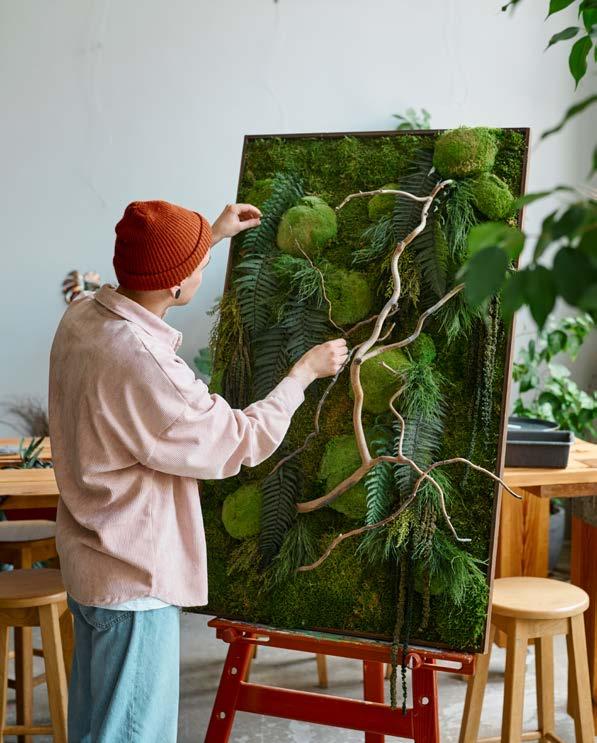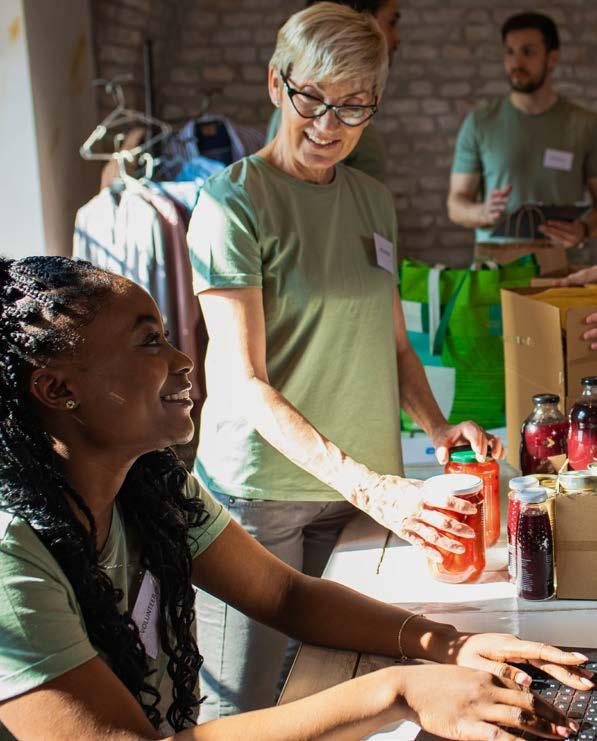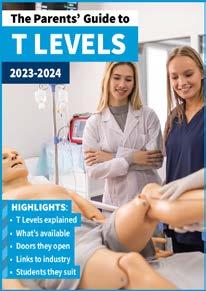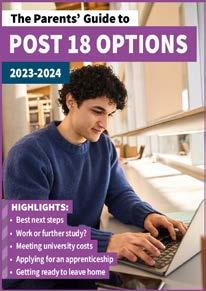stand out Helping your teen
HIGHLIGHTS:
• Hobbies and passions matter
• Most sought after skillsets
• How to get work experience
• Which hobbies develop which skills
• Play to their strengths




The Parents’ Guide to Helping your teen standout
2023-2024
Terms of use
This guide has been produced by The Parents’ Guide to and is licensed to Glyn School to share with parents and others connected with them throughout the 2023/2024 academic year. Click here to learn more.
Wherever we refer to ‘parents’ we mean ‘parents and carers’. This includes grandparents, older siblings or any other person with significant caring responsibilities for children.
How to get the most out of this guide
Contact
Email:
info@theparentsguideto.com
Follow us on :
Twitter: @Parentsguideto
Facebook: @Theparentsguideto
Instagram: @Theparentsguideto
Subscribe:
www.theparentsguideto.co.uk/join-us
► Useful links
If you want to delve deeper and find out more, we’ve included useful links to other reliable sources. Simply click on the picture icons to be taken to our recommended websites.
► Interactive
To make moving around this guide easier, the contents and chapter headings are interactive. Simply click on a heading to be taken to the chapter or page you would like to read.
► Call out boxes
Information we think is particularly important has been highlighted throughout this guide; pay special attention to these!
► Summaries
To help save you time, we have provided useful summaries at the end of each chapter containing the key points.
► Key terms
Easy to understand definitions are provided throughout this guide in the key terms boxes. Don’t let tricky terminology stop you from supporting your child.
► Case studies
Real-life examples give you a chance to hear directly from teens, parents, and teachers about their experiences.
This guide does not need to be read sequentially – browse what interests you most.










Introduction
What makes an applicant stand out?
Teens applying for the next opportunity after school will be of a similar age, have studied similar subjects and might even have similar grades. How can they be memorable to an interviewer? Very often it’s what they’ve done outside their academic studies that can make all the difference.
Don’t misunderstand us. We’re not saying qualifications aren’t important – they are. If your child has the ability and opportunity, they should do the very best they can in any academic qualifications they take. But when it comes to personal growth and developing transferable skills, it’s what happens outside the classroom that has the biggest impact. These qualities are interesting to interviewers because they indicate how well a student will fit in their organisation, how likely they are to do well and whether they will be easy to work with (or teach).
In this guide we explore different things your teen could do to expand
their interests, and how this is directly linked to supporting their applications (whether for jobs or further education) as well as helping them find out more about things they might like to do in the future. We show how taking part in different hobbies and interests can improve their skillset (such as being able to communicate well, work with others, problem solve, be adaptable) and develop personal strengths (such as improving confidence, being resilient, compassionate and empathetic). Best of all, these activities can be fun, so your teen will enjoy doing them too.
We’re not suggesting your teen should do all the things in this guide (please don’t try and make them!). We’ve included a wide range to appeal to different personality types, so whatever their preferences, there will be something that inspires them.
Before we start, let’s explore why transferable skills are important and which ones are especially valued.
If you’re interested in regular updates about other ways you can help your teenage children, click here and join our online community.
Sign up here
Transferable skills can be learnt and developed in one situation and then be used and applied in another situation

What are transferable skills?
Transferable skills, also known as soft skills, are not taught directly but developed through experience.
They are highly valued because they are essential to running a business well; the way employees relate to one another and how they go about doing their job underpins their ability to succeed. Because transferable skills are not industry specific and have equal worth in different job types, students that develop a strong set of transferable skills have more opportunities to switch between different sectors to find the roles and industry that suits them best.
What makes them transferable?
If someone is good at managing people, it doesn’t matter whether they’re working in a hospital, office or factory, they will still be good at managing people. They may need to learn other non-transferable skills to do their job well, but prospective employers will value a track record that proves they can inspire, motivate and lead a team,knowing that the industry specific skills (sometimes called “hard” or “non-transferable” skills) can be taught relatively easily on the job. Your teen might be able to prove their skills at managing people by starting up a regular fun run in a local park, or by inspiring a couple of their friends to take action on a cause that’s important to them.

Personal attributes
As well as transferable skills, there’s personal growth, which develops capability and potential. This includes personal traits (or values) and a small range of examples include courage, honesty, integrity, kindness, loyalty, optimism, reliability and trustworthiness.
How can my teen develop their personal attributes and transferable skills?
As a teenager, the best way of developing a broad range of transferable skills is through non-academic interests, such as hobbies, co-curricular activities, super curricular activities and ensuring a balance of time spent with family, friends, other students and alone.
Some of the most sought after transferable skills
We mention many soft skills throughout this guide, and below are some of the most useful:
✓ Analytical – Identifying patterns and observing people and behaviours
✓ Commitment – Understanding the benefit of maintaining interest over the long term, even when more exciting opportunities present themselves, to reap deeper benefits rather than instant gratification
✓ Communication – The ability to express complex ideas clearly and simply with others, either in writing on speech
✓ Critical thinking – Unafraid to ask questions and delve into deeper meaning
✓ Determination/Persistence – Not giving up when the going gets tough
✓ Focus – Being able to concentrate on one thing at a time and not getting distracted
✓ Inquisitive/Curious – Demonstrating an interest in finding out more, experiencing new things and expanding knowledge
✓ Leadership – Being able to motivate and inspire others to take or follow action
✓ Listening – Actively listening and hearing what others are saying instead of making assumptions and considering own response while others are speaking
✓ Passion – Feeling strongly about certain things and taking appropriate action to demonstrate and channel this passion
✓ Prioritisation – The ability to assess the difference between urgent and important in allocating time to tasks
✓ Problem solving – Being able to think of, and develop, inventive solutions to problems
✓ Resilience – The ability to manage stress and bounce back when faced with difficulties – required to succeed under pressure
✓ Teamwork – Being able to collaborate and co-ordinate with others to achieve joint objectives without being diverted by personal goals
✓ Time management – Using time effectively to maximise outcomes



“
Reading widely around my school subjects gave me a lot to say about why I was interested in applying to do Physics at university.


Research
Whatever it is your teen wants to do, they should find out more about it. This applies whether it’s a subject they’d like to study, a job they’d like to do or even a new hobby. They can research online, watch programmes (either fiction or non-fiction) or read about people that do it well.
If they can, they should also speak to people who are already doing it (or have done it in the past) so they can hear about first-hand experience. Ideally, this would be face-to-face, but phone call or emails are possible alternatives.
There are three benefits to this approach:
1. They are proving their interest by investing time and effort into finding out more;
2. It will give them things to discuss at interview that are different from what others are saying. Only they will have done their specific research, so they can explain how they went about it, what they learnt and which bits interested them most;
3. Reality is often different from theory! They might like the idea of something, but on further investigation find they’re not as keen.
If your child starts researching something and gets bored along the way, chances are this is not for them, and they can change tack and pursue something they do enjoy instead.
Research ideas
1. Subjects they might be interested in studying next
2. Industries where they might like to work
3. Different universities or colleges
4. Types of apprenticeships
5. Businesses where they have interviews
6. Hobbies that interest them
7. Celebrities they admire
Being able to research, consolidate and process information is itself a core skill that employers value as it is central to many jobs, and fundamental to succeeding in higher education.
✓ Analytical - Consolidating findings
✓ CommunicationSummarizing key points
✓ Focus - Identifying a subject of interest
✓ Initiative - Finding different sources about the interest
✓ Perspective - Creating an opinion from different points of view
✓ Prioritisation - evaluating which pieces of research should be used

Reading
Reading is a brilliant opportunity for your child to find out more about their curriculum subjects, favourite areas of interest, idols, topics they enjoy that are not covered at school and pretty much anything else on the planet –including fiction. If your child isn’t a great reader, no matter – they can listen to audio books instead.
Read outside set texts
With young adults of a similar age group, there’s a tendency for the curriculum literature to be quoted over and over in applications and interviews, often covering very similar themes.
Get your child to stand out by being able to quote something outside their set texts. But here’s the important thing. They must be able to discuss it and say how it has had an impact on them. There is little point in mentioning they have read something if they have nothing to say about it. Your child is looking to demonstrate that they can read something, digest it, summarize it, establish an opinion and express themselves. These are all transferable skills that are vital in the workplace and very useful in further study. It doesn’t matter whether your child concludes that they liked the book or not – it’s how they say it that matters.

Are they a people person?
See whether they are interested in biographical literature. If they read about their favourite idol, they might be able to talk about someone they really like and admire and still sound substantive, because they are not focusing on mainstream informationthey may have discovered something unique outside of social media sources.
Self development
There are plenty of books written for teens with guidance and tips on how they can prepare for life ahead, specifically from a teenage perspective. These cover all manner of topics, such as how to think positively or how to develop good working habits. Exploring some of these will help them cope with the challenges they are facing and prepare them for the future, as well as demonstrate to potential interviewers their passion and commitment to constantly improve.

Get your child to stand out by being able to quote something outside their set texts

Thinking beyond the obvious
If their goal is to study a specific subject or business area, then they must read around this prior to applications and interviews. They should research what’s available online, and then focus on one or two books that they can read to develop their knowledge in their particular areas of interest – whether it relates to the subject itself, or people who are known experts in the subject.
For example, if your child wants to read business studies, there are thousands of business areas to research and this could feel overwhelming; so why not select either a type of business or business expert and find out how they became an expert and inspiration.
Such as:
• how One and Only (established in 2002) became one of the premier, highest rated resorts in some of the world’s most beautiful places;
• how Harley Davidson started in a wooden shed as an engine to power a bicycle
• how Zoom started as a day-dream to solve the problem of a long-distance relationship.
This approach should enable them to spend their time doing something they enjoy, and be able to connect it to a goal they have set themselves for the future.
Skills they’ll develop
✓ Inquisitive – finding out more and/or exploring something new
✓ Commitment - Seeing a project through by reading the whole book (or more)
✓ Literacy – Reading (or listening): taking in information
Book Trust Waterstones
Amazon
100 books to read
Kings College

TED talks
An absolute blessing if your child has a short attention span. Most Ted Talks are no more than 15 minutes long, covering diverse subject ranges from science to business to global issues and feature some of the most eloquent, thought leaders of our times. It’s a great place for your child to develop their interests without a huge time commitment.
Search by topic, speaker, most viewed or length (some are as short as 6 minutes!). There’s also a wide variety of teen speakers, so great role models for your teen to identify with thought leaders of their own age.
Among the top 10 most viewed TED talks are:
• Do schools kill creativity ?– Sir Ken Robinson
• Your body language may shape who you are – Amy Cuddy
• How great leaders inspire action –Simon Sinek
• The power of vulnerability – Brene Brown
Useful links

Podcasts
Not every teenager loves to read, so podcasts are a fabulous way to discover interesting themes and topics. The length of podcasts vary significantly, some are short (say 15-20 minutes) others are feature length episodes; some are so long they are split into series; others are broadcast regularly as complete episodes with an overarching theme linking them together.
Podcasts are a relatively new media and very popular with teenagers. They’re also a great way to reduce screen time, because they’re all about listening, not looking. If your teen is hooked on their phone, it’s a good way for them to wind down before sleep, by dimming the lights, switching off the screen and simply listening in bed.
There’s podcasts on virtually any topic. Favourites for teens include:
1. MentalMusic
2. RadioLab
Audio Audio books
TED talks by teens TED talks
3. Stuff you should know
4. #WhoWouldWin
5. The Socially Awkward
Skills they’ll develop
✓ Balance – listening to different ideas and opinions, even if they don’t match your teen’s views
✓ Diversity – hearing new ideas from lots of different sources
✓ Focus - Exploring a subject of interest
✓ Initiative - Finding different sources about an interest
✓ Inquisitive – finding out more and/or exploring something new
✓ Listening – an under-appreciated skill. The saying goes: we have two ears and one mouth for a reason – we should do more listening and less speaking!

TED talks make you think, teach you something new and, very often, leave you feeling inspired


Current affairs
It’s a good idea for your child to be able to demonstrate some general knowledge. They should keep an eye on the news to be aware of headline stories.
During interviews, news topics can often be “elevator talk” – i.e. something that is mentioned when someone meets them at reception to take them to the interview room. It may not be part of the interview, but it can have an influence. Not knowing anything about world events suggests a lack of interest, which may not be true, but does not reflect well.
For teens with limited interest in current affairs, spending a couple of minutes each day capturing the highlights will probably give them just enough information to keep on top of subjects people are talking about. Hourly news bulletins on the radio, daily headline summaries on their phone or watching the first five or ten minutes of the evening news are quick ways to stay in touch. If they’re not interested in sports, then keeping an eye on World Cup events or national highlights (such as Wimbledon) means they will not be at a loss if someone strikes up a conversation with them.
If they’re not sure about news articles or are struggling to get a balanced view, they could try reading opinion articles to see what other people are saying so they can develop their own thoughts, having read two different sides of an argument.
News can cover a huge range of topics: what’s happening in the world – at home and internationally, sporting events, the environment, celebrities, popular television programmes, politics, tech and people interest. Even if your teen isn’t too interested in current affairs, there should be something featured regularly in the news that gets them interested and fired up to find out more.
✓ Curiosity – Identifying with wider issues rather than just those within their personal experience
✓ Empathy – caring what’s happening to others as well as themselves
✓ Inquisitive – Broadening their knowledge
✓ Passion – exploring issues that move them
✓ Relating – Understanding issues outside their own experience
Skills they’ll develop Useful links
BBC News The Week

Preparing for interviews
Research, reading, podcasts, TED talks and the news are all great sources of information to prepare for interviews. Your child could have great grades and work experience, but if they visit a prospective university or employer with little or no knowledge about that organisation they are highly unlikely to be successful in gaining a place.
If they are visiting a company to ask if they can volunteer, intern, shadow, or indeed work, they should find out about the company beforehand. This could include the brand overall, where they’re located, how many people are employed, how long they’ve been in business, their specialism, their values and the latest about them in the news (if there is anything). It’s also wise to find out a little about key employees, such as the Chief Executive, Chairman or founder.
For colleges and universities that are based away from where they live, finding out information about the local area will help them discuss why they would feel comfortable living there, should they get the place. This
is especially true if they are based in a more rural setting and the university is city based, or vice versa. Knowing the size of the organisation, how long it’s been established (especially with new universities or colleges) and positive aspects of its reputation will give relevant talking points and show that your child has thought broadly about why this organisation is right for them, rather than focusing only on course content or the job itself.
Skills they’ll develop
✓ Analytical – Considering suitability in multiple areas, such as job/course, location, size or organisation etc
✓ Culture fit/values – checking these are aligned with their own
✓ Curiosity – wanting to know more than the primary focus
✓ Initiative – finding out information without being asked
✓ Research – Ability to find out information for themself
Consider this chapter as a buffet menu. It can give your teen a quick taste for something they haven’t tried before that they may well enjoy, without committing them to the full meal if they find it’s not something they like.
We can’t broaden our interests if we don’t experiment with something new, but trying new things can be scary.
We’ve suggested easy ways for your teen to experiment with new ideas, initially using minimum time and financial commitment. It’s possible they may well find a true passion along the way. These are also the most straightforward ways for your teen to demonstrate their interest in a subject they’d like to study further, or a job they’d like to do, by finding out more beyond what there is in the classroom.
You may also be interested in:

The Parents' Guide to Apprenticeships
What's included:
• Types of apprenticeship
• The pros and cons
• Degree apprenticeships
• How to research an apprenticeship
• Top ten apprenticeship providers
• The application process
• How you can help them prepare for interview to make the best impression
• What you can do to help them get them ready for life at work.
Buy now


“
I didn’t enjoy my experience working in a bank. I’m glad I discovered this early as it gave me the time to explore and research other options.


The world of work
Some experience at work is crucial. It provides your child with first-hand experience of what it’s like to work (which is very different from school or college); dealing with colleagues and the public; working to deadlines and how it feels to do things “for real”.
If they’re lucky, they might get placed within an industry that is related to their course or ultimate job goal. If this is the case, it can help your child discover more about the industry and may help them realise whether it is or isn’t for them. A lesson much better learned sooner than later! Work experience is also great to demonstrate passion for a subject where qualifications in sixth form aren’t usually offered such as architecture, medicine, law, accountancy and so on.
How to find work experience
1. Do you have any contacts, through your own work, friends or family that could help and take on your child?
2. Your child can speak to the careers team at school. They have excellent connections with local and national employers
3. They can contact employers directly and ask
4. Get them to apply for a job (Saturdays, evenings, holidays) – it may not be their aspirational job, but it’s work experience and they’ll learn a lot from it (as well as earning some money) Student


In the workplace
Traditionally, work experience happens at a place of work where students can get real-life, on site experience. This would usually be a one or two week placement, typically in the summer term.
Part of the experience is dressing appropriately for the work environment, travelling to and from work, experiencing a full working day –whether that’s 9-5 in an office or 6-2 pm on the farm and getting a feel for how different job roles are inter-related and inter-dependent.
Try to match role to goal
Whilst any work experience is great, if your teen has ambitions to do a particular job, it’s worth trying to get the experience within that sector. If they feel destined to go into leisure, two weeks on the front-desk of a hotel dealing with the public could either confirm that’s the role for them, or give them an incentive to rethink
their ambitions! This is especially true when they have been inspired by TV or films, which quite often give a false impression of what’s involved in a job.
Be realistic
A week or two isn’t long to learn a huge amount about any job nor is it long enough to train someone in depth. Your teen may not be assigned the most interesting tasks, but overall they should get a good feel for the atmosphere of the environment and how people work together.
Some work experience is better than no work experience
If your child is struggling to find a suitable one or two week work placement, try looking at taking a different approach. Perhaps asking employers if they could visit for a day, support on a particular project or assist in a particular thing might help those employers say yes.
Virtual work experience provides the opportunity to explore different career options remotely

Virtual work experience
With so many restrictions to contain Covid 19 since March 2020, there are now many virtual placement opportunities. It’s a broad term and can include any experience which provides young people with an insight into what it’s like to work in an industry or job role while at home. Most virtual work placements range from half a day to one week, but some may last longer depending on the nature of the work experience and the age of your child.
Not all virtual work experience is the same. Some are open to everyone and provide a platform for students to discover more about the job, view pre-recorded videos on what it’s like to work with the organisation, go on virtual tours and possibly take part in some live Q&A sessions. Others may require your child to go through an application process and offer regular online meetings with a supervisor, individual project work, networking sessions, training opportunities and video tutorial. Most placements are free, but some may charge a small fee.

Transferable skills
It’s not always easy working from home and taking part in virtual work experience placements will help your child develop those soft skills that all employers are seeking, such as organisation, time-management and self-motivation.
May not fully reflect a particular job
There are limitations to what can be experienced through virtual placements, so make sure your child is aware that this may only provide a partial glimpse of what’s involved in the job.
Safeguarding
Be sure to check the company’s credentials and what information your child is giving to them. Most companies will have age guidelines for suitability, but if not, do make sure it’s age appropriate.

Shadowing and observing
Providing work experience requires considerable effort from companies in creating a programme and having staff on hand to run it. Not all companies have the resources to do this. If your child is struggling to get some sort of work experience, they could always approach companies and see if they could observe or shadow an employee.
What they’ll be doing here is watching someone else in a role and seeing what they do. It’s easier for companies to take part, as they don’t have to dedicate time to specific preparation, instead they provide explanations of their usual work practises as they unfold in real time.
Can provide high level oversight
It’s hit and miss as to how well the person they’re watching explains the job along the way, but it does give them the opportunity of shadowing someone higher up in the organisation, whereas if they were doing work themselves, they’d likely be starting at the bottom.
Useful links
Paperwork
There’s unlikely to be much in the way of paperwork for a shadowing role, so it’ll be up to your child to write up their experience and what they’ve learned from it. This is an important step, as it could be a long time between shadowing someone and talking about it at interview, so it could be easy to forget key learning points.
To allow access to real life situations and data without fear that information might be inappropriately shared outside the workplace, your teen may be asked to sign a confidentiality agreement.
Need inspiration?
• Spend the day with a personal assistant or business planning manager
• Visit a film or television studio for an application to study media or film
• Shadow a nurse at the hospital for an application to study medicine
• Shadow a hotel, catering or games arcade manager for an insight into the hospitality industry
• Shadow a farmhand and find out the routine from dawn til dusk Do-it search engine
Still struggling?
Even if your child can’t get an official observation, shadowing or volunteering opportunity, they can still get relevant experience by exploring opportunities available for free to the general public.
Some ideas include:
• Watching a debate in Parliament for an application to study politics
• Attending local magistrates court trials for an application to study law
• Visiting an exhibition, public talk or museum to demonstrate interest in a particular subject

Job shadowing is a great way for your child to observe specific job roles
Starting a business
For those teenagers with an entrepreneurial flair, starting a small business from home can help them gain experience and perhaps even make money in the process. If your teen has the enthusiasm and ability, starting their own business needn’t be costly and could give them an edge over others when it comes to interviews. This doesn’t mean full-time commitment – it’s something they could fit around studies or focus on only during school holidays. If things go really well, they may even have the beginnings of a career working for themselves.
Business ideas for teens to try
Your child will have the best chance of success if they start business based on the things they enjoy and are good at. If they are active, then they’ll probably prefer work that involves physical activity, where more studious teens will prefer opportunities that require lots of thinking and mental challenges. Possibilities include:
Technology/IT related
Technology is second nature to most young people, having grown up in a world where being online is as natural as breathing. Their computer skills often far surpass those of older generations, so what is straightforward to them could be something others struggle with and look to outsource. Web design, graphic design and creating online resources are ways where your teen might be able to help small business who can’t afford services of professional companies but don’t have the skills to do the job themselves. Offering these services at a small fee, or even voluntarily, will give them firsthand experience in a genuine role as well as teaching them how to express someone else’s vision whilst developing their own technical skills too.
Developing a passion
If your teen is keen on videoing, vlogging or photography, there’s money to be made in setting up a website, channel or podcast and sharing their thoughts on their

The Parents’ Guide to Prince’s Trust
specialist interest. This requires long-term commitment, as viewers typically expect to see posts on a regular basis. It’s a good way to express how they feel and improve the way they communicate. They can talk about products they like, issues that are important to them or hobbies.
Practical skills
There’s lots of avenues to sell online, so if they’re good at making things (such as crafts, cakes or personalized drawings), they could try selling their creations. This could begin among family and friends then extend beyond there. Baby-sitting, car-washing, running errands, tutoring younger students or weeding gardens are other possibilities.

Starting a business demonstrates initiative, drive and good timemanagement skills


Volunteering
Volunteering is a fantastic way to get work experience (albeit unpaid), give something back to the community and try out new things. It could also be the start of a lifelong way of living that provides a great feeling of fulfilment and is proven to be a contributor to personal contentment.
Volunteering can take place in short bursts (for example volunteering a festival for a few days in the holidays) or on a regular basis (such as volunteering in a local animal shelter on weekend mornings).
Volunteering ideas include:
• Local farm, zoo, veterinary practice or animal shelter;
• Hospital, care home or hospice;
• Local council or MP’s office;
• Homeless shelter or a food bank;
• Library or museum;
• Local, national or international Charities or political organisations
• Festivals or live events
• Helplines
• Cadets
Teens can volunteer from home by preparing flyers, writing blogs or managing social media – a great way to connect with local charities and especially valued by small organisations that have limited resources.
Useful links
Grow (Do-it)
Community sport volunteering

Work is work!
Don’t forget that work experience also counts if your teen is doing weekend, evening or holiday work. Getting a local job means it’s much less likely to be closely related to their long-term ambitions, and more likely to be something practical, located close to home (such as a job in a shop, fast food chain or a bar). There’s still value to be gained from these roles, including working with others, dealing with
Skills they’ll develop
✓ Curious – experience new things and situations
✓ Communication – Whether that’s face to face or online
✓ Data analysis – if they have been involved in scenario assessments
✓ Focus – Finding out more about their industry of interest
✓ Problem solving – Considering workplace situations and events
✓ Reliability – if working on a regular basis over the long term
the public, working under pressure, working unsocial hours and seeing how management roles differ from ground staff.
Depending on the opportunity and how long they have been working, it’s possible to develop all sorts of skills. It’s worth taking time out to chat through which skills they enjoyed developing, which ones they didn’t, and why.
✓ Resilience – An experience at work may not be how your teen imagined it but they must continue to do their best
✓ Time-management – Attending live sessions on time and submitting any course work
✓ Team work – If working with others
✓ Technical skills – specific to the type of work undertaken
✓ Writing – Working on websites/ preparing blogs
Work experience covers a range of opportunities, from attending the workplace in person, taking advantage of virtual placements or volunteering. What’s important is that your teen gets some firsthand experience of what it’s like to work in a real-life situation.
In an ideal world, they’ll get a genuine placement and be paid for their contribution. In reality, competition is fierce, many businesses are challenged
You

financially and under pressure. It’s better for your teen to accept a virtual or non-paying role rather than not get any experience at all. Most schools focus on work placements for Years 11 and 13 in the summer term – don’t leave it until the last minute to secure their place. The best opportunities will get snapped up quickly, much earlier in the year.
The Parents' Guide to Post 16 options
Includes information on:
• What qualifications are on offer
• Which qualifications are better suited to different types of learners
• Where they can study – the pros and cons of different learning environments depending on the type of student
• Considerations in making the right choices
• GCSE results day – what to do if they don’t get the results they need
Buy now


My school didn’t run a Biology Club so I started my own. We organised events, volunteered at Earth Day clean ups and even invited a guest speaker to present. “

Developing their passions
Don’t make the mistake of thinking that in order for your child to stand out they need to do lots of things that are related to the subjects they want to study or their chosen future profession. This is a common mistake and can result in parents pressurizing their children to stop doing things they enjoy (so they focus on study) which can lead to them missing out on establishing good lifelong hobbies or developing friendships that are not connected to academics.
Balance is key
Balance is key. Adults who are able to combine being active, having fun and working usually achieve more because they use their time effectively when focusing on any one area and moving between areas gives their mind time to refresh as they concentrate on something else.
Developing their passions
What’s great about this is that it could cover anything, be exclusively focused on something your child enjoys, and may even be completely outside the mainstream. The point here is: does your child have a passion for anything? It may seem a strange passion, it may not be a passion a future employer shares, or it could be something totally conventional.

Typical hobbies might include reading, football, gaming, vlogging but less usual hobbies might include stand up comedy, candle making, puppetry, pet sitting, stone skipping or rapping. Does their hobby result in them meeting and communicating with new people (whether online or in person?), learning a new skill, competing in teams, getting creative or being extremely time efficient? These are all excellent transferable skills that are central to helping your child stand out from others.
Of course, it’s not always true, but it is rather nice if your child’s hobby takes them offline for a little bit too!
Skills they’ll develop
✓ Communications – Listening, speaking, reading and writing;
✓ Critical thinking – unafraid to ask questions and delve deeper into meaning
✓ Problem solving – Linguists usually demonstrate creativity, logic, imagination and lateral thinking
✓ Analytical – Identifying patterns, observing people and behaviour
Joining a club is a great way to show passion for a subject and commitment

Societies, clubs and groups
Sometimes it’s easier to learn new things and discover new interests in a group. Jointly sharing a new experience and then talking about it together is very powerful.
Join a society, club or group
Schools are fantastic at offering opportunities for students to learn new things outside the academic curriculum and it’s easy for your child to take part because everything is arranged and organised for them – all they have to do is show up!
Lifelong benefits
It’s also a great way of introducing possible lifelong hobbies that are good for their physical and mental wellbeing, as well as giving them ways to meet new people with similar interests throughout their life, no matter where they’re based in the world later on. If they move to a different town (or even country) – perhaps to follow a chosen career path, it could help them settle into a strange town by giving them a straightforward way to connect and meet new friends, both inside and outside the workplace.
Joining any club has benefits
Some clubs may be connected to their subject interests or future aspirations. This will help them find out whether they really do love a particular subject (or future career idea) and widen how they experience it and what they know about it. Other clubs may have no connection

at all but will provide the chance to try something new and learn more about an area that may not be covered either at school or at home (such as a science fiction club or comic club).
Whatever club they choose to join, they’re all beneficial in some way or another because they support personal development. Clubs cover anything (and more), from specialist art, board games, debating, drama, enterprise group, fashion, Model United Nations, quizzing, sports or stretch and challenge.
Joining a club is a great way to show passion for a subject and commitment (if they attend over a regular period of time).
Skills they’ll develop
✓ Commitment – attending over a period of time
✓ Communication – with those that are part of the club
✓ Curious – choosing to try different things
✓ Leadership – dependent on activity
✓ Passion – for interests they spend personal time on
✓ Teamwork – many clubs include collaborative activities
Societies, clubs and groups
Start a new society, club or group
Your child may have an interest in something that isn’t catered for via the school. If there is a local club they can join to enjoy this hobby, that’s fantastic and it will give them something to discuss that most of their peers haven’t experienced.
If there isn’t a club, setting one up shows initiative, organisational ability and good communication skills – as well as creating an outlet for your child to express their passion. Get your child to speak with a relevant member of staff at their school about starting a group or club in their school, or alternatively you might want to help them set one up outside of school by providing a space in your house at weekends or after school.
Skills they’ll develop
✓ Initiative – creating a club from scratch
✓ Communication – getting the club off the ground
✓ Leadership – taking action and leading others
✓ Passion – for interests they spend personal time on
✓ Prioritisation – having an idea, finding a venue, getting people to join
✓ Problem-solving – taking an idea from concept to reality

SPORTS
• Athletics and track
• Badminton
• Ballet
• Biking
• Basketball
• Cricket
• Cross country running
• Fencing
• Football
• Golf
SCHOOL SUBJECTS
• Art
• Business / Enterprise
• Design Technology
• Drama
• English / Creative writing
• Geography
HOBBIES / INTERESTS
• Animé
• Baking
• Chess
• Choir
• Circus skills
• Coding
• Comedy
• Cookery
• Dance - ballroom, breakdance, hip-hop
• Debating
• Fashion
• Film
• Gardening
• Gymnastics
• Martial arts
• Parkour
• Rowing
• Rugby
• Sailing
• Skiing
• Squash
• Strength and conditioning
• Swimming
• Tennis
• History
• ICT / Computing
• Language
• Maths
• Media studies
• Music
• Science - Biology, Chemistry or Physics
• Journalism / school newspaper or magazine
• Orchestra
• Origami
• Photography
• Podcasts
• Poetry
• Politics / MUN
• Public speaking
• Radio
• School council
• Sculpture
• Sewing
• Sign language
• Sound recording
• Yoga
• Young Enterprise


Sport
Schools will offer a variety of sports activities and there are bound to be lots of clubs in your local area offering other sports not covered by the school. There are huge benefits to getting involved in sports, including:
• Being active and staying physically fit;
• Building physical strength and endurance;
• Co-operating with others and thinking of the whole rather than individual in team sports;
• Endurance and self-reliance for solo sports;
• Setting and achieving goals;
• Meeting, connecting and relating to other people;
• Dedication and reliability – in practising and continued participation.
Interviewers, whether for jobs or further education, tend to be interested in an applicant’s sporting interests. Reasons for this include the skills the candidate is likely to have developed through sports participation, an interest in players for school/university teams and common ground for conversation.
Useful links
The Youth Sports Trust Do-it search engine
Alternatives
If you child is not keen on sport, try to find out why and suggest alternatives that avoid the parts they don’t like. If they’re not competitive, avoid team sports and go for solo activities, such as hiking, mountaineering, bike riding, swimming. If they don’t like danger, try safer sports such as tennis, badminton, golf, table tennis or yoga. If they don’t like getting changed in public, find somewhere they can practise sport and arrive already kitted out, or choose a sport that doesn’t require specialist sportswear.
If they don’t like sports at all, is there something they enjoy that means they’ll regularly be active? Trampolining in the garden. Dancing in the bedroom. Walking locally. Anything that gets them moving.
Supporting mental wellbeing
Taking part in physical activity is a key component of strong mental health as well as strong physical health. Not liking or taking part in sport doesn’t mean they won’t be successful, but if they don’t do some physical activity it could lead to health issues both in the short and long term.
Skills that matter
✓ Commitment – Showing up to games and training
✓ Determination – Striving to continually improve
✓ Leadership – Inspiring and leading others
✓ Resilience – handling pressure and learning how to win and lose
✓ Stamina – Improving physical fitness
✓ Team work – co-operating and communicating with others if playing team sport

Playing a musical instrument cultivates creativity, develops key skills and improves wellbeing

Getting musical
Aside from being the most popular person at parties and get togethers, playing an instrument has numerous benefits. It stimulates the brain and helps physical co-ordination. It can be relaxing or stimulating, helping to adjust mood. Progress and improvement provides a sense of achievement whilst fostering patience.
Time management
It takes time to master an instrument, so factoring in lessons and practise to an already busy schedule will teach your teen how to make the most effective use of their time.
Sharing
Almost everyone loves music, so it’s a great way to share good times and great experiences together – especially with others that aren’t musically gifted.
Music exam qualifications
Admissions staff, colleges and interviewers often look favourably on students with practical music exam qualifications, as they indicate
self-discipline, motivation and organisational skills.

Useful links
Skills they’ll develop
✓ Commitment – it takes time to master a musical instrument
✓ Creativity – Interpreting how the music can be played
✓ Determination – Striving to continually improve
✓ Multi-tasking – Reading and interpreting the music, physical dexterity in playing the right notes
✓ Resilience – It takes time and multiple attempts to get it right
✓ Team work – co-operating and communicating with others if playing in a band or orchestra
UCAS tariff points are awarded to students attaining LCM Advanced Level music qualifications (grades 6, 7 and 8), in both practical and theory subjects. TED talk

Learn a language
If your child has an aptitude for languages, learning a second (or third) language has many cognitive benefits, such as better memory, problemsolving and critical-thinking skills, improved concentration, enhanced listening skills and the ability to multitask. It demonstrates commitment and an ability to balance personal academic study with school lessons.
Learning a new language can be challenging and is not suitable for everyone. It can require a significant time investment over a long period of time, so your teen shouldn’t do this if it will impact their primary qualifications. However, if it’s something they find easy and enjoy, it could prove extremely beneficial – even if it’s only learning a few conversational phrases for holidays.
If you speak a language other than English at home already, finessing it (both verbally and written) could be relatively easy and give them a significant edge in the future.
Skills that matter
✓ Communications – Listening, speaking, reading and writing
✓ Critical thinking – unafraid to ask questions and delve deeper into meaning;
✓ Problem solving – Linguists usually demonstrate creativity, logic, imagination and lateral thinking
✓ Analytical – Identifying patterns, observing people and behaviour
The great thing about hobbies is there’s something for everyoneno matter how unique. The range is endless. We understand it can be tricky to feel comfortable that your teen is making valuable use of their time, especially if they’re chosen hobbies aren’t what you would have chosen for them!
Almost without exception, they’ll be something in a hobby that’s developing soft skills and having downtime is essential to mental and physical wellbeing. However, no-one should be focusing all their time on just one thing, so do make sure they are enjoying a range of activities and not focusing only on one.
You may also be interested in:

The Parents' Guide to Homelife and study
Includes information on:
• Keeping them healthy
• Providing the right homelife
• Ways to help them revise
• How to support them during exam time
• How to help them with exam nerves
Achievements and awards

Achievements and awards

“
Over the summer break
I completed a short course in computer programming - I’ve now applied to three apprenticeship programmes in the same field.
Achievements and awards

Achievements and awards
There are lots of activities that your child can take part in through school that offer awards recognizing achievements. Some schools directly provide opportunities to participate whilst others provide referrals to take part via community lead programmes. Awards can be for academic, creative or sporting achievements. If your child is interested, options include:
Sporting achievements
Playing for a school or local club, captaining a team, taking part in a sporting competition or going on a sports tour can all provide an opportunity for your child to showcase skills and character traits they have acquired during their school years. Make sure your child doesn’t focus solely on their victories and the level at which they are playing, although this can be an important point to make, but also the skills they developed whilst committing themselves to regular training over a significant period of time

Performing arts
Playing a musical instrument or performing on a stage shows commitment and dedication to perfecting a skill (including learning lines). Playing in the school orchestra, organising a charity event or performing in a school play are all worthy and credible experiences to mention. Don’t forget, most academic establishments have their own orchestras and theatres!
Skills they’ll develop
✓ Self-improvement – striving to be better
✓ Passion – going beyond for an area of interest
✓ Self-discipline – to regularly put in the time to succeed
✓ Experience/knowledge – of chosen subject/area
✓ Resilience – succeeding under pressure (for exams/tests/ public performances etc)


Leadership roles
We’ve called this leadership roles, but maybe we should have renamed it roles with responsibility.
Leadership skills are prized in many organisations because, in the most part, managers are made due to their competence in the job, not their ability to manage people. Where companies can employ people that have developed a talent for leadership, it saves them challenges when they’re looking to make internal promotions later on. Equally employers are looking for employees who are willing and able to step up and take on more responsibility.
Many clubs or groups have roles for their members. This might be club president, sports captain, accountant, social rep and so on. Do encourage your child to apply or volunteer for these roles as this can demonstrate many key skills that are highly valued – and can rarely be demonstrated in school experience.
In addition, taking on these roles will help your child with their personal selfdevelopment. If these roles do not exist, your child could always set one up for themselves, such as volunteering to run a particular project or a fundraising programme for their club.
Skills they’ll develop
✓ Leadership – inspiring others to be interested and take action
✓ Creativity – doing things differently
✓ Positivity – Helping others see things from a positive perspective
✓ Prioritisation – Working out where to focus so that multiple strands of the project are managed effectively
✓ Communication – sharing ideas and vision
✓ Time management – getting things done within agreed timeframes
Taking a course demonstrates initiative, drive and intellectual curiousity

Take a course
If there’s something that really interests them, why not take an online course? Choosing to study outside of the school curriculum, and taking assessments / exams to prove knowledge, is very impressive. It shows initiative, commitment, and an ability to follow through – all desirable qualities whether the next stage is further education or finding a job.
If they are looking to study a subject at sixth form (or beyond) that they haven’t studied before, it also shows the interviewer that they have taken steps to confirm their interest and suitability.
This doesn’t have to require massive commitment; some courses and modules are very short – others are longer. What’s on offer is vast, and lots of the courses are free, although there is usually a small fee to receive a certificate.
Taking a course is also a worth considering if they are struggling with any of their chosen examination subjects. Choosing a course in a subject they find difficult could help them improve their
Useful links

understanding and could be less costly than hiring a tutor if they just need a little additional help. Sometimes seeing information presented in a different way can be enough to make things click.
Skills they’ll develop
✓ Commitment – Seeing something through, even though it may be more difficult than initially thought
✓ Critical thinking – Unafraid to delve into deeper meaning
✓ Curiosity – Expanding knowledge and experience in non-curricular areas
✓ Determination– doing more than the minimum required
✓ Reflective – Finding different ways to become their best self
✓ Self-reliance – Showing initiative in pursuing independent learning


Enter a competition
There are lots of competitions online: writing fiction, creating fashion, submitting essays, maths, science as well as many relating to curriculum activities. Some may require a little effort for entry, others may require lots. Working to a specification, creating something that meets that specification and working to a deadline (in this case a competition close date) illustrates terrific transferable skills.
It’s great to include on CVs, and if they win or are acknowledged as a good entry, it can be a great confidence booster. However, win or no win, entering a competition demonstrates initiative, intellectual curiosity, drive, research skills, preparation and organisation, which should be the primary focus when including them in applications or talking about them in interviews.
Skills they’ll develop
✓ Listening – Being able to work to the competition specification
✓ Passion – Having a passion and taking it to the next level
✓ Prioritisation – Being able to create an entry and manage school work at the same time
✓ Research – Finding relevant competitions aligned with their area of interest
✓ Time management – Meeting the competition deadline
Duke of Edinburgh Award
Duke of Edinburgh Award
Duke of Edinburgh (DofE)
The Duke of Edinburgh Award is a youth achievement award which focuses on community. It improves physical health, develops skills including resilience, determination, team work, and independence. It’s highly regarded and participants are well respected.
Anyone aged between 14 and 24 years old can take part in a DofE programme and there are three levels which, when successfully completed, lead to a Bronze, Silver or Gold Duke of Edinburgh’s award.
There are four sections to complete at Bronze and Silver level and five sections at Gold:
1. Helping the community or environment through voluntary work;
2. Becoming fitter through exercise;
3. Developing a new skill;
4. Planning, training for and completing an expedition;
5. Working as part of a team on a residential activity (Gold only).
DofE is a big time commitment and will usually take at least six months to achieve a Bronze award, twelve months to achieve a Silver award and eighteen months to achieve a Gold award.
All young people who achieve a Gold Award will be invited to a Gold Award Presentation, attended by a Member of The Royal Family and usually located in St James’s Palace, London.
Skills they’ll develop
✓ Self-improvement – striving to be better
✓ Self-discipline – to regularly put in the time to succeed
✓ Experience/knowledge – of chosen subject/area
✓ Self-reliance – overcoming obstacles alone
✓ Teamwork – co-operating with others to achieve success
✓ Dedication – requires regular commitment over an extended period

This is the more challenging end of the spectrum and takes more dedication and commitment to achieve success. For that reason, we wouldn’t recommend pushing your teen to take up these interests, the enthusiasm does need to
You may also be interested in:
come from them. That said, as with many things in life, the rewards are very fulfilling if they are able to dedicate the necessary amount of time and the benefits will last long into adulthood. Useful

The Parents' Guide to Homelife and study
Includes information on:
• University
• Apprenticeships and degree apprenticeships
• Higher education courses at college
• Traineeships
• Jobs with training
• Gap Years
• Starting their own business Buy
www.theparentsguideto.co.uk

Visit The Parents’ Guide to for more support:
Parent Guides
Our range of interactive guides provide you with easy to follow advice, hyperlinks to reliable sources and the most up-todate information.
Parent newsletter
Sign up to our parent newsletter and receive free support, advice and resources on how you can help your teenage children straight to your inbox.


Support articles
You may be interested in:

1. Helping your teen find work experience
2. Teach your teen the skills to study effectively
3. Stressed out teen? – 10 ways to reduce stress instantly
4. Why starting a business helps develop transferable skills
5. Ways to keep your teen safe online
www.theparentsguideto.co.uk/parents


Final Words
Standing out from the crowd means your child has some interests and experiences which have impacted them uniquely; either by making them think differently or benefiting them in some way (or both).
It is very important that they can articulate WHY these experiences have had an impact, not just WHAT they have done. For example, if your child loves knitting that’s great, but if that’s all they can tell an interviewer it doesn’t really mean anything. If they can say, I love knitting, it really relaxes me and I love that I can make unique scarves, hats and jumpers for a fraction of what they cost in the shops – and they make fantastic, very personal presents for
birthday and Christmas – it says a lot about the personality of your child.
You can help your child get into the habit of explaining the WHY as well as the WHAT by regularly asking them about it. This will get them comfortable with a great technique to use in interviews and applications.
Time spent outside of study can be extremely valuable in shaping your teen’s future success. Interests that don’t seem connected to their ultimate goals could well have a significant impact on whether they achieve them, and it will help them discover what they do enjoy and what they don’t, which will help lead them towards the right path.

Our specialist guides for parents:









Parent Guides:
Our range of interactive guides provide you with easy to follow advice, hyperlinks to reliable sources and the most up-to-date information. Shop now

The Parents’ Guide to
stand out Helping your teen
2023-2024
